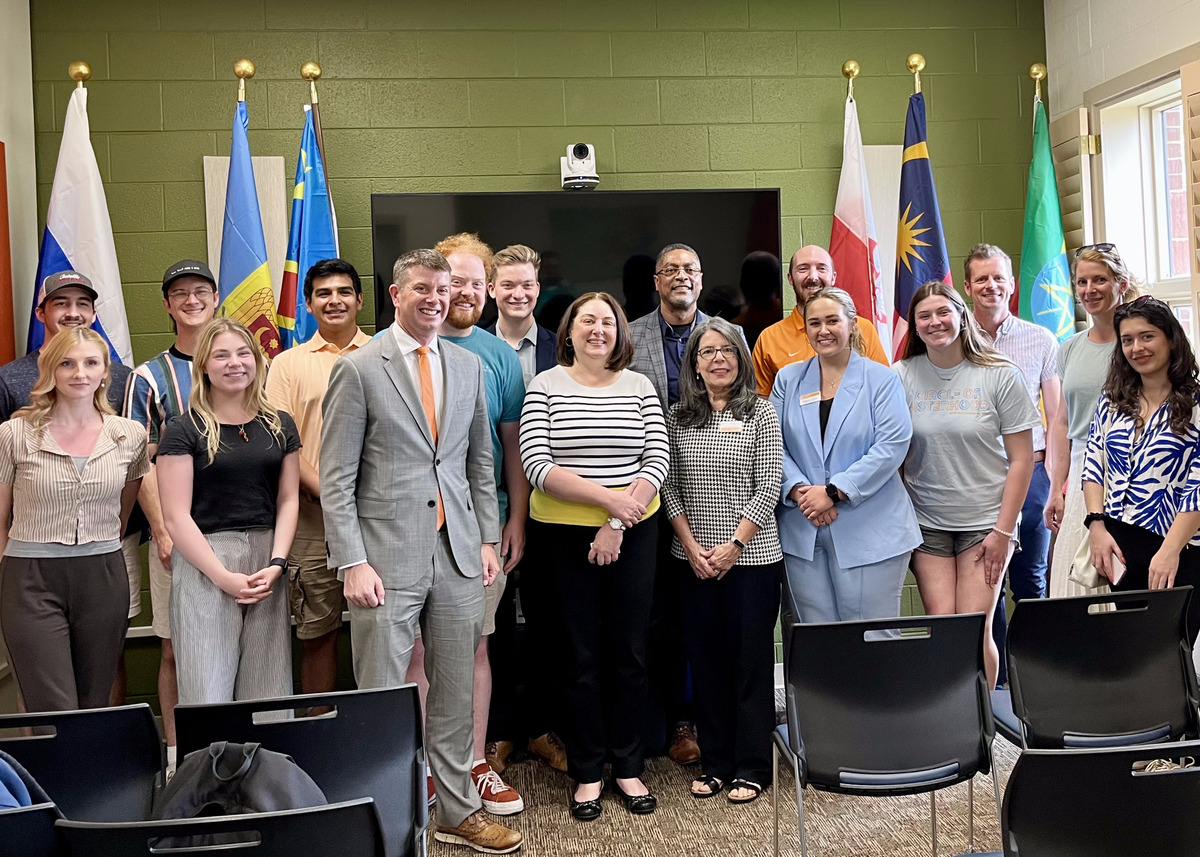
US Department of State officials and UT students, faculty and staff at the International House
by Jessica Foshee
In April, high-ranking US Department of State officials held a meeting at the International House for students to learn about careers in the Foreign and Civil Service.
The DOS website explains that “Foreign Service employees live and work overseas, and in Washington, D.C., and represent America abroad,” while, “Civil Service employees support the mission from Washington, D.C. or other locations around the United States.”
The meeting provided students with an opportunity for an inside look at first-hand experiences from the DOS officials and why the officials chose their specific career path. The officials also gave helpful advice on how to prepare for a future career in diplomacy.
“The DOS officials made a passionate argument in favor of person-to-person connections and their power to make the world a safer and more prosperous place. They provided real life examples to students of how things like studying abroad or learning a foreign language can be the first step toward a career representing the US around the world,” said Erik Simons, assistant director of the International Student and Scholar Services office at the University of Tennessee, Knoxville.
Julie Stufft works in the Foreign Service as the deputy assistant secretary for visa services in the Bureau of Consular Affairs. She was one of three DOS officials in attendance at the event to share her expertise with students. “Meeting people and colleagues from other countries and cultures, being a part of a place that most Americans don’t get to see and doing it on behalf of the United States is such a life-changing experience,” said Stufft.
She shared that language-learning is a heavy focus for a career in diplomacy, which the DOS provides as a part of the job. Once assigned to a location, learning the new language for the assigned country takes about a year of full-time learning before serving overseas.
Madison Watts, Global Studies and Russian language major, said, “Most of the students that attended are pursuing foreign language degrees, so information about being able to work abroad and use these language skills really benefits students’ career trajectories. Hearing about personal experiences from employees of the DOS and realizing they started out with similar interests and goals makes this career path seem more attainable and rewarding.”
Watts said the meeting helped her better understand the importance of global engagement by seeing its benefits firsthand. Meeting the DOS officials showed her how being globally engaged impacted not only the DOS officials’ careers, but also their outlooks on the world.
Seeing how global engagement impacted the DOS officials’ worldviews reminded Watts of her time abroad. While participating in an educational program in Kyrgyzstan, she became an actively engaged global citizen without realizing the true importance at the time. “Putting engagement on a global scale by sharing culture, language and experiences allows us to live in a world with better cultural competence,” said Watts.
Ilina Arsova, international PhD student in the Department of Kinesiology, Recreation and Sport Studies, has previously worked in sports diplomacy in Macedonia, so she “was really happy” when she found out the DOS was giving their presentation. “I decided to come because my connection with UT goes back to 2012 when I was nominated by the U.S. Embassy in Macedonia to participate in a state department program called Global Sports Mentoring Program that empowers women through sports, which is implemented by the UT Center for Sport, Peace and Society.”
Emile Hawkins, division chief of Service Integration and Innovation in the Bureau of Consular Affairs, works in the Civil Service at the DOS. He explained that there are also opportunities to work for the DOS in foreign affairs while staying in the U.S. “If you first decide to join the Civil Service, you can transition to the Foreign Service later. The opportunities are endless. We have lots of positions for applicants from various backgrounds including data analytics, cybersecurity and other positions for STEM majors.”
For many UT students, serving in the Foreign or Civil Service is an avenue to carry the Volunteer spirit of service and leadership into the world.
Open positions for careers in both the Foreign and Civil Service at the DOS can be found at careers.state.gov and usajobs.gov.
CONTACT:
Jason Moody (865-974-5752, jmoody9@utk.edu)